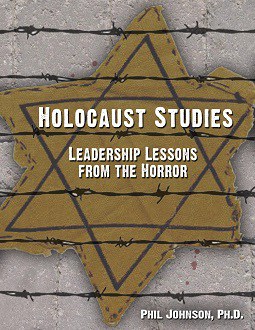Holocaust Studies for Leaders: Leadership Lessons from the Horror
Cost: $2450, plus airfare (USD)
Dates: 01/03/2026 – 01/10/2026
Location: Krakow, Poland (8 Days)
Cost: $2450, plus airfare (USD)
Dates: 01/03/2026 – 01/10/2026
Location: Krakow, Poland (8 Days)

Day 1
Board your overnight flight across and cross the Atlantic on your way to Poland.
Day 2
After arriving at the airport in Krakow, the group will get settled in the hotel and enjoy a night view of Krakow’s historic square. Following dinner we will have a brief time of orientation before falling exhaustedly into bed!
Day 3
Today is all about the Old City of Krakow. The entire medieval old town is a UNESCO World Heritage site. Our hotel is located inside the ancient city walls, so we will enjoy a walking tour of a city that is truly beautiful and bursting with creativity following the fall of Communism. This city is full of legends and stories, from the Cloth Hall to St. Mary’s Basilica.
Day 4
To really understand Poland, you have to understand the impact of Communism. Today we’ll take a crazy tour with some crazy guides into the history of Communism in Poland. We’ll ride on a Communist-era bus (if it doesn’t break down!) and ride in Communist-era cars as we visit sites that reflect upon the bleakness of the Communist system. Our afternoon in Krakow will allow us to take it easy, do some souvenir shopping and appreciate the culture. We will stroll through the squares, visit the shops, eat the food and reflect upon our time together in this historic and beautiful city. In the evening, we will meet for our studies of the Holocaust.
Day 5
Today we will head over to Auschwitz and participate in a guided tour. Auschwitz-Birkenau is the most well known cemetery in the world and place of genocide. Started in 1940 as a concentration camp for Polish political prisoners in 1942, it became the center for extermination of European Jews. In the years 1940-45 the Nazis killed about 1.5 million people there, mainly Jews as well as Poles, Gypsies, Russian POWs and members of other nationalities. The experience will break your heart, which is not a bad thing for leaders who want to impact a broken world. Leadership sessions continue in the evening.
Day 6
It’s time to lighten things up a bit! In the morning we will head out for a visit to the Wieliczka salt mines. Legend has it that the salt mines in Wieliczka were part of the dowry of the Hungarian princess, Kinga, when she wed Boleslaw the Shy over 700 years ago, making the Wieliczka Salt Mine one of the oldest in all of Europe. Over the centuries, devout and superstitious miners have carved fabulous figures, monuments and altarpieces out of its salt walls. These amazing works of art, in addition to the historical importance of the mine, have earned the Wieliczka Salt Mine a place on the UNESCO World Cultural Heritage list. You will also probably lick the walls – bring water to quench your thirst! In the afternoon we will pick up our theme of the Holocaust with a visit to the former Jewish Ghetto of Krakow.
Day 7
For over a thousand years, Krakow has been the center of science, culture and art in Poland. On our last day in Krakow climb Wawel Hill, crowned by Wawel Castle and Wawel Cathedral and the seat of royal power up until the 17th century. The Castle was home to many Polish kings and queens and the royal crypts in the Cathedral their final resting place, along with several other Polish heroes. In the Main Market Square, the large Gothic Cloth Hall is the perfect place to shop for local souvenirs. The last sightseeing stop is the twin-spires of St Mary’s Church with its famous medieval altar by Wit Stwosz and where, every hour the brave trumpeter of Krakow still calls out his warning. You will enjoy free time for shopping in the afternoon and in the evening, we will conclude our Holocaust Studies conference.
Day 8
Depart from Krakow with a lifetime of great memories!
Leadership Training Course: “Holocaust Studies: Leadership Lessons from the Horror”This unique course will glean important leadership truths and principles from the horrors of the Jewish Holocaust. We will look at the factors that led to this genocide, the lives of those involved on both sides of this event, the attitudes of global leaders at the time and the influence their leadership had on a generation of people. We will also look at history, truth, propaganda, Holocaust denial, and how historical events can be used to shape people, influence leaders and even change the geopolitical history of millions of people. What is the lasting legacy of this event – and could it have been predicted?